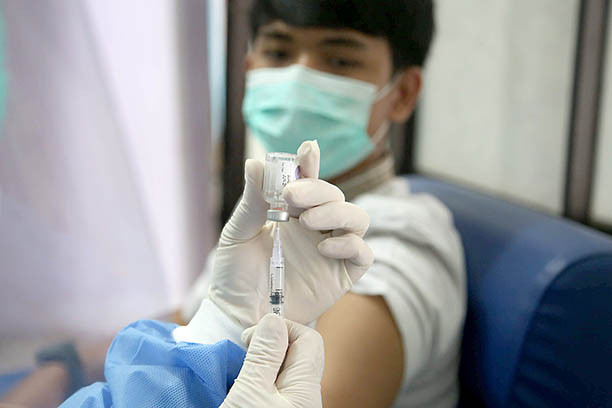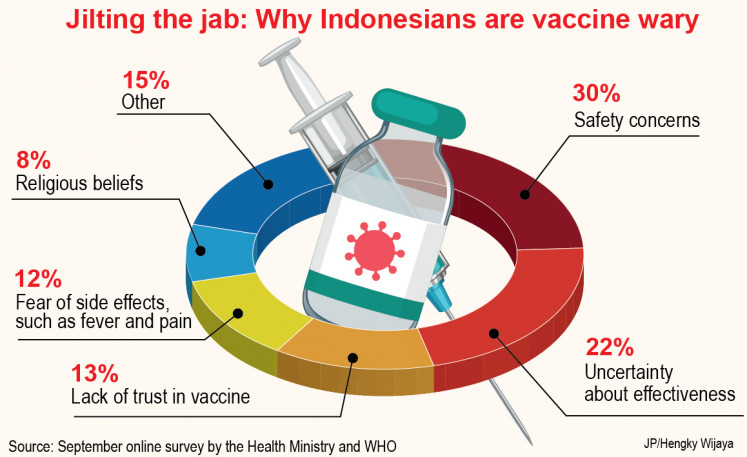Popular Reads
Top Results
Can't find what you're looking for?
View all search resultsPopular Reads
Top Results
Can't find what you're looking for?
View all search resultsOnly one in three Indonesians willing to pay for vaccine: Survey
Change text size
Gift Premium Articles
to Anyone
A
n online survey carried out by the Health Ministry has found that only one third of Indonesians wanting to get COVID-19 shots are willing to pay for a vaccine.
The survey was carried out alongside the Indonesian Technical Advisory Group on Immunization (ITAGI) with support from UNICEF and the World Health Organization from Sept. 19 to 30. More than 115,000 respondents in 508 of all 514 cities and regencies across the country's 34 provinces were questioned.
The report found that 65 percent of respondents were willing to receive a COVID-19 vaccine if it is available for public use, while nearly 8 percent said they would reject it. The remaining 27 percent of respondents said they were still hesitant -- which the report described as a group that was "critical for a successful vaccination program".
However, among those who wished to be vaccinated, only 35 percent were willing to pay for it. Approximately 38 percent were unwilling to pay, and the remaining 27 percent were undecided.
Read also: Vaccine doubts point to flaws in govt’s COVID-19 message
Respondents’ willingness to pay for the inoculation varied between 32 and 41 percent in provinces of Java.
The survey also found that people in Papua, Kalimantan, Maluku and the Lesser Sunda Islands -- like Bali, Lombok and Flores -- generally showed a higher willingness to pay, and those in provinces of Sulawesi and Sumatra were least willing to pay.
Why Indonesians are vaccine wary (JP/Hengky Wijaya)Overall, the lowest level of willingness to pay was reported by day laborers, drivers and domestic helpers at 12 percent, although 60 percent of them would like to get vaccinated.
More than 31 percent of those willing to accept the vaccines and pay for them said they would only pay up to Rp 50,000 (US$3.56), while 28 percent would pay up to Rp 100,000 and about 4 percent would fork out more than Rp 500,000. This trend reflected a connection between affordability and the socioeconomic status of the respondents, the report said.
Most of those still undecided about paying for a vaccine said they would not pay more than Rp 50,000.
Read also: No emergency vaccine approval this year in Indonesia, says BPOM
Health Minister Terawan Agus Putranto has said that the government only plans to cover the cost of inoculation for 32 million of the 107 million people targeted to receive COVID-19 vaccines by 2022, which has sparked criticism and calls for wider coverage of free vaccines.
Terawan said the vaccination program would target 67 percent of 167 million people aged between 18 and 59 years, as recommended by the ITAGI. The remaining 75 million people would have to pay for their vaccines at private hospitals and clinics.
Experts have expressed concern that such a private scheme may stall Indonesia's efforts to reach the desired coverage necessary to achieve herd immunity, especially in a country that has seen its people avoiding vaccination for other diseases for various reasons, including religious concerns.
"Respondents raised significant concerns about vaccine safety and effectiveness, expressed their lack of trust in a vaccine and raised concerns about the haram-halal classification of vaccines," the report said.
Read also: Indonesia greenlights adoption of major COVID-19 vaccines
The most common reasons for rejecting COVID-19 vaccination are concerns about safety (30 percent), uncertainty about the effectiveness (22 percent), a lack of trust in the vaccine (13 percent), fear of side effects such as fever and pain (12 percent) and religious beliefs (8 percent).
Generally, the report found that the higher the economic status, the higher the acceptance rate. However, the wealthiest respondents reported the highest refusal level at 12 percent, while middle-class respondents reported the lowest level at 7 percent. One third of the respondents of poor economic status had yet to make up their minds, as the survey found that the level of hesitancy tended to decrease with the increase of economic status.
Following widespread criticism, Coordinating Human Development and Culture Minister Muhadjir Effendy said the government's decision on the 30 percent government-paid and 70 percent private scheme was not yet final.
"This is still tentative, I don't have the authority on this [...] Possibly it'll be 50-50, not [30-70]," Muhadjir said in Jakarta on Monday, as quoted by tribunnews.com.
Editor's note: This article has been updated to include Muhadjir's statement.











